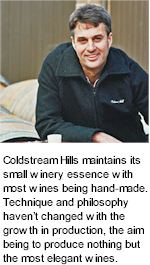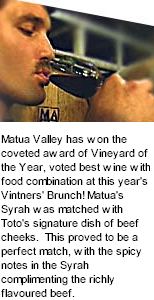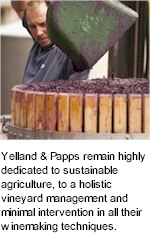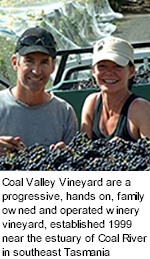| |
|
|

|
Johann Gramp planted the Barossa's first commercial vineyard along the banks of Jacob's Creek in 1847
He Had No Intention Of Establishing A Brand He just needed wine Today's Gramp is vinified from a collation of the finest parcels grown to superb sites in McLaren Vale. Regular inspections of vineyards with a proven record for quality, consistency and character are conducted to pinpoint the most opportune dates for harvest. Following a traditional vinification and extended ageing, only those barrels of exceptional quality are included into the finished wine.
|
|
|
From South Australia's
McLaren Adelaide

Pale straw hues. Attractive array of nectarine and granny smith, vanilla, spice and mildly roasted nuts. The palate has an initial hit of creaminess, quite strong in stone fruit and white flowers. Mid palate reverts to a more streamline shape as seaspray and nutty nuances emerge. The finish is long and dry, with just a whisper of vanillan, a lovely modern style of Chardonnay.
|
|
|

|
Three choice sites
Delivering A Palette Of Subtle Complexities Are closely managed to yield a special quality of fruit for Nautilus Cuvee Dominated by the aromaticness and masculine red fruit complex of the larger component Pinot Noir, the style is one of elegance and finesse, at the same time exhibiting real fullness of flavour. A wine that marries the old world gracefulness of Methode traditionelle with the new world charm of Marlborough.
|
|

CRAFTED FROM CHOICE PARCELS OF SHIRAZ AND GRENACHE, picked off d'Arenberg's low yielding 19th century vineyards, very much a traditional style of wine. d'Arry's Original is named in honour of principal, d'Arry Osborn, a Winemakers Federation of Australia Patron and recipient Medal of the Order of Australia. One of d'Arenberg's most enduring labels, originally called d'Arry's Burgundy in the 1960s, when medium bodied red wines with a soft finish were always called Burgundy.

LEASINGHAM HAVE REMAINED AT THE FORE OF CLARE VALLEY VITICULTURE, making great wine since 1895. They have since established an endowment of the region's most auspicious vineyards. Leasingham claimed the highly prestigious Jimmy Watson Memorial Trophy for its 1994 Shiraz, the first time a Clare Valley producer won the accolade. Sourced from superior sites, including the distinguished Provis and Schobers properties, Bin 61 speaks profoundly of the elegant spice characters and intense blueberry mint perfumes which are unique to Valley Clare.

YELLOW LABEL BUILDS ON THE SUCCESS THAT WOLF BLASS HAS ENJOYED AFTER MANY YEARS OF PERFECTING A PURE MERLOT, to produce an everyday wine of quality, consistency and charm. Yellow Label represents a soft and flavourful Merlot with gentle tannins and mouthfilling varietal plum fruit flavours. Grapes are sourced from some of the finest vineyards in South Australia, highly specialised to yield harvests of Merlot which are second to none. Perfect with lamb and a treat alongside juicy roast pork and crispy yorkshire pud.

FIVE GENERATIONS OF VITICULTURE MAKE BROWNS ONE OF THE FEW FAMILY OWNED LABELS STILL PRODUCING OUTSTANDING VINTAGES OF PADTHAWAY SHIRAZ. Planted predominately to the renowned Terra Roa over limestone super soils, Brown's vineyards have long provided the harvests for the nation's leading brands. Treated to an extended term of age in the pick of American and French oak hogsheads, T-Trellis is a big, generous, complex earthy wine, led by magnificent bouquets of savoury floral, chewy licorice and winegum spice, Shiraz of seamless balance, supported by ripe, mouthfilling berry flavours.
|
Since its first
vintage in 1985, Coldstream Hills has grown to be one of the Australia’s leading small wineries, with a reputation for producing an outstanding range of wines
Coldstream Hills was established in 1985 by James and Suzanne Halliday. As a winemaker for over 30 years, James Halliday expressed his passion through involvements with other winemakers, devoting his time to crafting some of Australia's most memorable labels. From its initial vintage of 450 cases, Coldstream Hills has grown to become one of Australia's leading small wineries, its wines sold in some 16 countries and a reputation out of all proportion to its size. Coldstream Hills maintains its small winery essence with most of the wine literally being hand made. Situated in the cool and beautiful Yarra Valley, about one hour's drive east of Melbourne, its steep, close-planted vineyards have become a signature of the region. So too have its wines (most notably Chardonnays and Pinot Noirs) which reflect a climate cooler than Bordeaux and a little warmer than Burgundy.

France also provides all the oak barriques (1500, but increasing year by year) and no small amount of inspiration for the winemaking team. To create the specialties of the Coldstream Hills winery each year outstanding parcels of grapes are earmarked for special attention during making, using new French barriques.
The emphasis at Coldstream Hills is on the varietal fruit and length of flavour which the Yarra Valley bestows on each grape variety. The varietal wines are designed to be enjoyed upon release - attractive when young, but will certainly reward careful cellaring. The wines are quite literally, hand made, mainly using small open fermenters (of three to four tonnes capacity) for the red wines, while the white wines are barrel fermented.
These techniques are directed to making wines which are characterised by elegance and finesse, by silky supple texture, length of flavour, subtle oak and the ability to develop extra dimensions of complexity with bottle age. These are not weighty, extractive, tannic or alcoholic styles, however impressive well-made examples of these may be.
When the resulting wine is regarded as outstanding it forms the strictly limited quantity of wine bearing the Reserve label. While the fruit remains the driving force, there is more focus on structure and complexity. The Reserve wines are designed to improve for at least five years, and live for a decade or more.
Coldstream's founder James Halliday, is one of Australia's most distinguished wine journalists, consultants and judges. With two other Sydney lawyers, he founded Brokenwood in the Hunter Valley in 1970. After moving to Melbourne for his law firm in 1983, he and his wife established Coldstream Hills in 1985. He worked as a hands-on winemaker at Brokenwood, at Coldstream Hills, and several stints in France, before increasing age persuaded him that jumping in and out of open vats could be a terminal health hazard. As a journalist he has written over 45 books and several thousand newspaper and magazine articles, winning a number of major wine writing awards in Australia and the United States. He was also awarded Australia's most prestigious wine award - the Maurice O'Shea Award - for Outstanding Contribution to the Australian Wine Industry in 1995.
Growing up in
a winemaking family in the winemaking community of West Auckland, Matua Valley's founders Ross and Bill Spence developed a vision for New Zealand's future
Back in the early 70’s, the vision of Matua Valley’s founders Ross and Bill Spence was to revolutionise the still fledgling New Zealand wine industry, taking advantage of unique regional qualities to create innovative and distinguished wines – the kind they wanted to drink themselves. They succeeded, beyond their wildest dreams. Today, Matua Valley wines are acclaimed and highly sought after throughout the world.

After six years developing their craft in the industry, the brothers established the Matua Valley winery in 1973. From their first successful vintage, produced in the old Tin Shed at Auckland, the brothers went on to win awards and accolades from Sydney to London. Their greatest achievement in these early days was the production of the first New Zealand Sauvignon Blanc. Today, Matua Valley is well on the way to becoming a globally respected fine wine brand. Such recognition will be the Spence brothers ultimate achievement, and a benchmark for other New Zealand winemakers to aspire to.
Viticulture is the science, art, or process of cultivating grape vines. Matua Valley have always had a hands on approach to this science and art. The philosophy is simple, to produce the best quality fruit possible, with consistency from vintage to vintage. But simple doesn't mean easy - there's a lot of hard work involved. The winemakers at Matua are fortunate to have a member of the founding family, Simon Spence, managing both the company-owned vineyards and the contract growers. His role is to keep a close eye on all the vineyards, ensuring maximum productivity and consistent quality. These goals are achieved by harnessing particular viticultural techniques for each vineyard based on their terrior, a combination of topography, soil and climatic conditions.
Mark Robertson, formerly Matua's chief winemaker, credits Simon's results in the vineyard as one of the key factors in achieving our superior quality wines. Grapevines go through an annual cycle, involving a time-honoured series of viticultural tasks. Dormant over the winter, the vines are pruned, shoots are trained and extra foliage is plucked by hand to give the grapes maximum sunlight exposure and to concentrate the flavours. Matua monitors the vines throughout the growth cycle, looking for any sign of pests or disease. As members of a sustainable wine growing programme, the Matua vignerons intervene at the last possible moment to minimise spray requirements.
Thinning of the vines is carried out systematically to ensure a balanced fruit to leaf/vine ratio, and to maximise quality. Netting of the vines is conducted to provide protection from birds. Picking is only done at the time of optimum ripeness and flavour development, in close consultation between the viticulturalists and the winemakers.
Matua's winemakers are wine lovers, always looking for new ideas and applying the best of them to the production of the wines. They rely heavily on optimally ripe fruit to make the distinctive wines. Special pride is taken in the produce extracted from the older vineyards. The last twenty five years have seen the gradual evolution of some very special styles which are getting better with each vintage. Winemaking is an art, a craft and a science that has evolved over many centuries. Like all crafts, it improves with repeated practice and with the judicious combination of ancient techniques and modern technology.
The Yelland and
Papps story perhaps doesn't fit in with the usual line spun by wineries in the Barossa - six generations of this, five generations of that
It is a story about new beginnings, a story about a young couple, with a young family, forging their own path within a wine region as first generation winegrowers. While not locals, there is a saying in the Barossa that you have to have a grand-parent in the ground before you are considered a local, Susan Yelland and Michael Papps call the Barossa home and are as passionate as any sixth-generation Barossan about the region, its vines and its history and its characters. Michael has lived in the Barossa for the past 20 years, working in the wine industry in a number of sectors from winery work to bottling lines and wife Susan, moved to the Barossa in 1999 from the Yorke Peninsula after time spent in Adelaide and New York studying at the Windows of the World wine school. Today Michael and Susan own a five acre property on the valley floor out side of Nuriootpa and have two young children, Peyton and Campbell.

With no prior study in winemaking they started producing wines from 2005, initially only for family and friends and Susan and Michael soon realised that their passion lay in the wines and vines of this famous region and Yelland & Papps was born.....and the passion runs deep. It encompasses not only the old-vine material of the Barossa, names familiar to all such as Shiraz, Cabernet Sauvignon, Grenache and Mataro all make an appearance in the Yelland & Papps range. It's a passion for the future stars of the Barossa, varieties such as Vermentino, Carignan, Roussanne, Barbera, Dolcetto, Primitivo, varieties that are well-suited to Australia's most famous wine region and the proof is in a glass of Yelland & Papps wines.
Yelland & Papps embarked upon their ventures of winemaking in the right way, purely for their own enjoyment and for the appreciation of family and friends. They remain dedicated to sustainable agriculture, to a holistic vineyard management and minimal intervention in the winemaking.
They are passionate about running a small winery and living in a sustainable fashion, of using minimal inputs during the winemaking process to allow the fruit to speak in a clear voice, uncluttered by over zealous oak and a heavy hand. Passionate about the produce they farm, a visit to the charming Yelland & Papps cellar door will see you sampling their Delight, Devote and Divine wines but seasonal produce fresh from the property - walnuts, lentils, jams, terrines and vegetables are all on offer.
Rated five red stars and one of the Ten Best New Wineries in Australia by James Halliday, the wines of Yelland & Papps have certainly hit a chord with wine press gaining rave reviews in James Halliday's Wine Companion, Nick Stocks Good Wine Guide, Winefront, The Adelaide Review Hot 100. But it is the wine drinker that has come to love and appreciate the wines of the new Barossa that Yelland & Papps represent, balanced, flavoursome and food-friendly offerings that are produced in a thoughtful fashion, respecting the history of the Barossa and the land from which the come from.
In a relatively short space of time, Yelland & Papps have become one of the brightest stars of the New Barossa. One of the producers leading the region into the future while showing a deep respect for the past, experimenting with new varieties and techniques and aiming for a sustainable future that they can pass on to their next generation. The wines and the philosophy behind them speaks volumes.
Coal Valley Vineyard
are a progressive, hands on, family owned and operated winery vineyard, established 1999 near the estuary of Coal River in southeast Tasmania
The story of Coal Valley Vineyard began with a passion for wine. After years of travelling and working around the world in their professional careers of biology and chemical engineering, Todd Goebel and Gill Christian were ready to get their hands dirty and realize a long held dream. Tasmania was developing a reputation as Australia’s premier Pinot Noir, Riesling and Sparkling wine producing area and this vineyard was already winning gold medals at the local wine shows for Pinot Noir, Chardonnay and Riesling. Fifteen years later, Todd and Gill are proud of what they produce and love what they do. They enjoy their work in the vineyard, making good wine and the sharing the finished product!

Todd and Gill are focused on and passionate about, producing small quantities of high quality, cool climate wines. Sustainable agriculture is important and dictates their viticultural management techniques. In the vineyard, Todd and Gill hand prune and shoot thin each vine as they aim for perfection. All grapes are hand picked and hand selected off the vines to produce single site Coal Valley vintages. The aim is to deliver top quality wines from a truly world class, cool climate site. Wines which reflect the unique terroir of Coal River Valley and represent a satisfying experience with every sip.
With about 17,000 vines to individually hand prune, it's immensely gratifying to look back with a sense of accomplishment when the job is done. Cane pruning means pulling out everything that was growing the previous year, except one cane, tying it down to the wire for the next season's canes to grow out. The cuttings are dropped on the ground and then mulched to send all that energy back into the soil.
Organic fertiliser and soil conditioners are spread amongst the vines, it's then time to sit back and wait for new green growth to appear, as it always does, in the first week of September. Throughout veraison and the ripening of fruit, Todd and Gill try to find time to meander through their protea garden and enjoy beautiful panoramic views out over the vineyard, looking across to the Coal River estuary below, Pittwater and Barilla Bay.
|